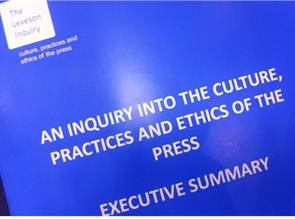
If there’s one subject that the media love to talk about it’s the media. Little wonder then that the Leveson Inquiry has generated so much interest. Politicians too are fascinated since they work so closely with the media – and vice versa. Add to this the idea that politicians are split on an issue relating to the media, with the Prime Minister taking one view and his deputy taking another and you can see why this story is one that will run and run.
But what effect will Leveson have on those outside this particular hot house? How will Leveson affect organisations and their spokespeople in their dealings with the media? It’s a question that we’re often asked in our media training courses.
The most important point is that it will not change what makes news. Certain key factors will continue to drive the new agenda. Something new and unusual that also has an element of human interest and is relevant to the audience will always be what interests journalists. Bearing these in mind when preparing for interviews will still be very important.
One probable change is that newspapers will be better behaved – well, for a while at least. Remember their brief period of contrition following the death of Princess Diana? They will certainly think twice about hacking into phones and computers for the foreseeable future.
However, newspapers are fuelled by consumer demand and this is even more the case now that they are in decline. If editors believe that there is a demand among readers for intrusive celebrity coverage or interviews with the bereaved they will put this into the papers. The only difference is that they will be slightly more careful about how they get these stories.
Newspapers will also be searching ever harder for a scoop. A recent poll for BBC Radio 5 revealed that two thirds of the public have little or no trust when it comes to newspapers.
To overcome this and to counterbalance the “celebs ‘n’ sobs” stories newspapers will almost certainly want to justify their existence by looking for exposés that really do tick the public interest box. These will be the classic cases of corruption among public officials, organisations doing things they shouldn’t and companies cheating consumers.
Any organisation that thinks that Leveson will keep investigative journalists or just good, keen reporters at bay and will somehow prevent them exposing what they see as wrongdoing should think again. If your data goes missing or one of your products is found to be dangerous then you can still look forward to the prospect of being inundated with aggressive calls from journalists and having them invade your reception area.
If anything, organisations need to keep their crisis management manuals even more up to date in this post-Leveson world.
Neither will journalists feel the need to hold back during interviews. Again, in order to show that they are on the side of the public and have a legitimate role to play they will feel even more obliged to get that killer quote from an interviewee or push that interviewee into revealing something he or she shouldn’t have.
The Leveson findings and recommendations will almost certainly contribute to the continued growth of the Internet. The case of Sally Bercow and her tweets about Lord McAlpine was in some ways even more significant than Leveson. If you think that newspapers can be rough, tough and lawless, then in the media terms, they’re teddy bears compared to the growing power of the Internet.
Every organisation should be regularly checking the Net for references both to itself and its products and services. Similarly, part of the preparation for a spokesperson before a media interview should be to Google their organisation, their sector and anything else relevant to the interview. That way they’ll be forewarned about other relevant issues.
Leveson is certainly a major event in the world of the media and it’s still too early to know exactly what its impact will be but one thing is for certain: both newspapers and the broadcast media are and always will be very useful tools. To be handled with skill, care and professionalism.
For more information about Media First please click here
